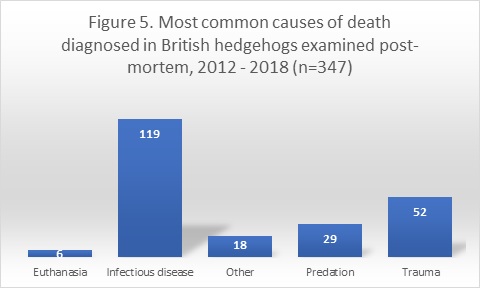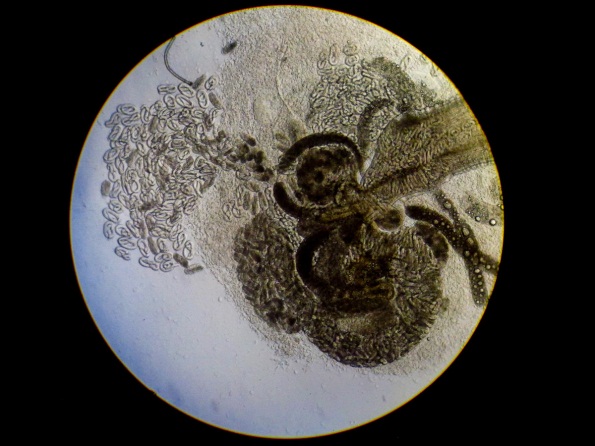ZSL’s Garden Wildlife Health team investigates the hedgehog
23rd January 2019
Garden Wildlife Health (GWH) is a national wildlife disease surveillance project co-ordinated by a team of wildlife vets at the Zoological Society of London, in partnership with scientists at the British Trust of Ornithology, Froglife and the Royal Society for the Protection of Birds. Our aims are to monitor the health of wildlife in Great Britain and determine the significance of infectious (e.g. bacterial, viral or parasitic conditions) and non-infectious disease (e.g. environmental toxins) as a threat to wild animal welfare and conservation, with a focus on garden birds, birds of prey, reptiles, amphibians and hedgehogs.
To do this, we appeal for help from members of the public, asking them to report sightings of sick and/or dead wildlife via our dedicated online reporting system (www.gardenwildlifehealth.org). When a freshly dead wild animal is reported, our wildlife vets contact the reporter to discuss submission of the specimen for post-mortem examination.
These reports and examinations have enabled us to learn a great deal about the conditions affecting native wildlife, and how we can mitigate potential health threats with best-practice garden management.
Since 2012 we have been investigating whether disease may be contributing to the ongoing decline of Great Britain’s hedgehogs. For this species alone, we have received over 700 disease incident reports (Figure 1) from across the country and performed around 350 post-mortem examinations (Figure 2) to date.

Figure 1: Distribution of disease incident reports regarding sick hedgehogs received by Garden Wildlife Health, 2012-2018. Image credit: Zoological Society of London

Figure 2: Distribution of hedgehogs submitted for post-mortem examination to Garden Wildlife Health, 2012-2018. Image credit: Zoological Society of London
Some of the most commonly reported signs of ill health in sick hedgehogs include lethargy and being seen out during the day (Figure 3), but in hedgehogs that have been found dead there are very often no apparent signs of illness.

Through performing post-mortem examinations (Figure 4), however, we have been able to determine the cause of death in over 75% of cases, and this is most-often attributed to infectious disease (Figure 5). Although we have diagnosed a number of different infectious diseases affecting hedgehogs, with multiple conditions sometimes affecting the same animal, there is no evidence to date that any particular condition occurs at a scale sufficient to lead to population decline. As such, further work is required to understand what impact infectious and/or non-infectious diseases may be having on Great Britain’s hedgehogs, but with each report received and post-mortem examination undertaken, important new insights are gained.

Figure 4. Post-mortem examination being performed on a hedgehog by Garden Wildlife Health wildlife vets. Image credit: Zoological Society of London

It’s important to be aware that, whilst disease-causing agents, such as parasitic lungworms (Figure 6) and bacterial pathogens, for example Salmonella, can cause sickness and death in hedgehogs, their presence does not always signify disease. We commonly find these organisms in otherwise healthy hedgehogs, and infection may form part of the natural relationship between a host (in this case, hedgehogs) and its parasites.

Figure 6. Adult and larval lungworm (Crenosoma striatum) collected from the lungs of a hedgehog during post-mortem examination. Image credit: Zoological Society of London
How you can get involved with Garden Wildlife Health:
-
To learn more about the diseases we commonly diagnose in hedgehogs, visit the online library of disease factsheets on our website, or follow us on Facebook and Twitter for the latest project updates.
-
To help us continue to learn about the health of hedgehogs in Great Britain, please report any sightings of sick or dead animals to gardenwildlifehealth.org.
-
If you are concerned about the welfare of a sick or injured hedgehog, please contact the RSPCA, your local wildlife rehabilitation centre or local veterinarian for advice.

